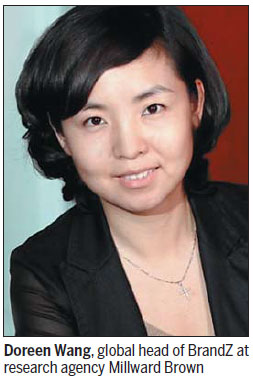Branded into overseas minds
Updated: 2015-02-06 07:34
By Cecily Liu(China Daily Europe)
|
|||||||||||
Appliance makers must invest more time, effort and money in image to win over markets, says expert
Branding will be essential for Chinese appliance makers to grow over the long term in international markets, says Doreen Wang, global head of BrandZ at research agency Millward Brown.
Chinese home appliance companies once active overseas as original equipment manufacturers are now focusing on developing their own core brands abroad, a strategy she says is proving far more profitable.
Indeed, China's strongest home appliance brands have gained a large proportion of their revenues from overseas sales, she says.
"While they may be wary - or simply unaware - of Chinese products in many categories, overseas consumers are very willing to make Chinese home appliance brands a part of their daily lives.
"Having gained experience manufacturing for other international brands, China's home appliance brands have the necessary skill sets, technical expertise and local knowledge to deliver quality and value to consumers worldwide. As part of their brand-building efforts they are also building massive production bases and sales and servicing networks in foreign countries."
But the main challenge, she says, is "the low awareness in consumers' minds".
"There is not enough local marketing and brand building behind them, so other brands can copy their products quickly," she says.

She says many Chinese appliances are now expanding in emerging, less-competitive markets, including the Middle East and Africa, while also maintaining a presence in mature markets such as the United States and Europe.
Wang, who has worked in marketing and client management for more than 15 years, has helped some of the biggest Chinese home appliance brands grow in international markets.
She says these companies need to invest more time, effort and money into building their brands.
One reason Chinese appliances makers have not invested in building their brands could be related to their experience in entering foreign markets, Wang posits.
Haier, for instance, first ventured 15 years ago into the US by selling compact refrigerators to college students, filling a gap in the market. That approach was successful and Haier had gained 53 percent of market share in a few years.
But the next step is for Haier to debut more of its products and to build trust among consumers.
"The good news is that in the last couple of years their distribution has increased significantly. In the US, you can find Chinese TVs, air humidifiers and microwaves in places like Walmart." she says.
Wang says "the first step to establish a consistent international brand is to develop a consistent brand image in the home market. Chinese appliance makers also need to identify their star products to boost their image. This should be a real breakthrough product for which the company can put much of its marketing and strategy behind.
"So if your communication effort is supporting the corporate brand, it is less relevant to the consumers if it's a new brand. But if you put a lot of marketing investment behind one star product, you will have a better chance to make a breakthrough in the market."
She says that though some Chinese appliance brands believe they already have a star product in the market, they need to reinforce their marketing efforts behind that product to make it stand out. The absence of stronger campaigns allows rival brands to catch up with trending technologies, forcing Chinese appliance makers to lose their first-mover advantage.
Wang says Chinese brands can learn a lot from Japanese and South Korean companies' strategies in international marketing.
"For example, Samsung and Sony have built a truly global communication platforms that ensure a consistent delivery of its positioning overseas."
Two Chinese appliance makers have invested heavily in marketing and sponsorships. Haier sponsors National Basketball Association games and Hisense is the lead sponsor of Hisense Arena, a sports venue that is part of the Melbourne Park complex in Australia.
Wang says that as global sentiment for the "Made in China" stigma changes, Chinese appliance brands are no longer seen solely as makers of cheap products in international markets.
Chinese companies that have gone public abroad, such as e-commerce company Alibaba on the New York Stock Exchange, have also significantly boosted the image of other Chinese companies.
Wang says Chinese appliance makers have the potential to better market their user-friendly products to distinguish themselves from Japanese and South Korean products that are more detail oriented.
"South Korean and Japanese products are super detail-oriented and are of high quality. But on the other hand their technologies can be a burden for consumers. But Chinese products are simple and easy to use," she says.
Haier's refrigerators, for example, previously had freezers at the bottom of the units, creating a headache for housewives. The company recently redesigned the fridges with freezers installed at the top.
Another factor that makes it more important for Chinese appliances to focus on branding is the shift from OEM to selling branded products in international markets. Haier was previously an OEM for Whirlpool and other brands before selling its own branded products on international markets.
"It's a great move. Building their own brands will help lower their competition. ... With your own brand you get direct relationship with consumers, and this relationship is more solid than business-to-business ones," Wang says.
cecily.liu@chinadaily.com.cn
(China Daily European Weekly 02/06/2015 page7)
Today's Top News
Chinese FM eyes 'harvest' for ties with Slovakia
Russia leads UN initiative to target IS
New Greek govt lobbies across Europe for solution to its debt
Birmingham plans to transform city into global financial hub
China: Norway violates rights of Chinese scholar
Italy extradites suspect in theft
A great future for UK-China business relationship
Former IMF chief Strauss-Kahn on trial over pimping charges
Hot Topics
Lunar probe , China growth forecasts, Emission rules get tougher, China seen through 'colored lens', International board,
Editor's Picks

|

|

|

|

|

|





